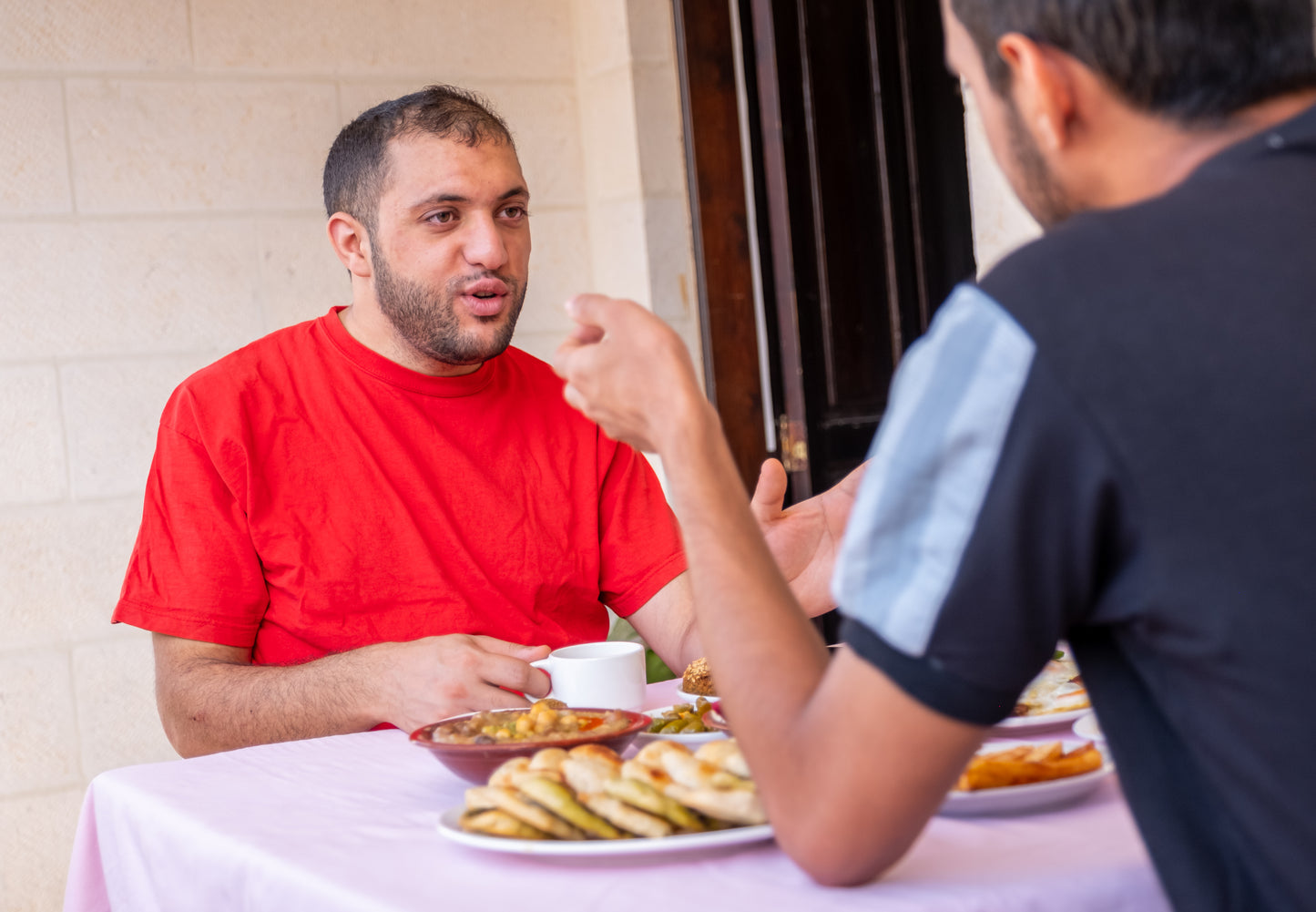Aprenda sobre los musulmanes

¿Por qué los musulmanes?
"Tomé el curso Encuentro con musulmanes porque no me gustaban los musulmanes. Al final de la clase, Dios me había dado un amor tan grande por ellos que no puedo imaginarme haciendo otra cosa que no sea trabajar con musulmanes". - Estudiante de primavera de 2016
Algunos consideran que el Islam es el mayor desafío para los cristianos en la actualidad. Lamentablemente, los cristianos rara vez se acercan a los musulmanes. Algunos piensan que es difícil llegar a ellos con el evangelio. Otros simplemente no saben cómo compartirlo con sus vecinos musulmanes. Encontrarse con musulmanes puede ayudar a derribar estas barreras.
Las amistades con los musulmanes son fundamentales para que los musulmanes comprendan el evangelio y para que podamos entender el mundo de hoy. Los musulmanes son hospitalarios y tienen una cultura y una historia ricas y diversas. Además, los musulmanes tienen muchas necesidades que deberían impulsarnos como cristianos a responder con compasión. Expresar respetuosamente nuestra fe en Jesucristo puede ser una parte natural de nuestras amistades con los musulmanes. Los musulmanes reverencian a Jesús, y en los últimos 30 años se han convertido en sus seguidores más musulmanes que en los 1250 años anteriores.
Más bien, honren a Dios como Señor en sus corazones. Y estén siempre preparados para responder a todo el que les demande razón de la esperanza que hay en ustedes. Pero háganlo con mansedumbre y reverencia. (1 Pedro 3:15)
El mensaje de este curso es esperanzador y amable debido a nuestra creencia en Jesucristo y su modelo de ministerio hacia los demás.
Ideas erróneas comunes sobre los musulmanes

Los musulmanes viven en el Medio Oriente.
La mayoría de los musulmanes (mil millones) viven en Asia, sobre todo en el sur y el sudeste asiático. Más de 300 millones de musulmanes viven también en el África subsahariana.
Las cuatro poblaciones musulmanas más grandes se encuentran en Indonesia, Pakistán, India y Bangladesh, cada uno de los cuales alberga a más de 100 millones de musulmanes.
Oriente Medio es un término vago y a menudo negativo que no refleja con precisión dónde viven los musulmanes.
La mayoría de las personas que viven en el norte de África, la península Arábiga y el suroeste de Asia son musulmanes, pero constituyen sólo alrededor del 20% de todos los musulmanes.
Los musulmanes no creen en Jesús y no están interesados en él.
Los musulmanes respetan profundamente a Jesús como profeta de Dios y valoran sus enseñanzas. A menudo, los musulmanes nombran a sus hijos en honor a Jesús, a quien llaman Isa , aunque no entienden que Jesús es el hijo de Dios ni que murió en la cruz por los pecados de la humanidad. Sin embargo, el Corán menciona a Jesús 93 veces, enseñando que realizó milagros, nació de una virgen y regresará como Mesías. Los musulmanes pueden preguntarle: “¿Por qué los cristianos no siguen las enseñanzas de Jesús?”
Los musulmanes están involucrados en la Yihad (guerra) contra nosotros.
El significado de la palabra árabe yihad es lucha. Generalmente significa una lucha del alma contra sí misma y los deseos pecaminosos. Los musulmanes se refieren a esta lucha interior como la yihad mayor. Los musulmanes también realizan campañas sociales para acabar con la pobreza y el hambre, a las que también llaman yihad.
El Islam oprime a las mujeres.
La mayor parte de la opresión de las mujeres por parte del Islam y los musulmanes, que recibe mucha publicidad, suele deberse a costumbres y tradiciones locales. Las mujeres musulmanas han sido presidentas y primeras ministras. El Islam no permite la violencia contra las mujeres ni obligarlas a hacer algo contra su voluntad. El cuidado de las viudas, los huérfanos y los pobres es una de las enseñanzas más firmes del Islam. Lamentablemente, muchas mujeres sufren opresión. Sin embargo, se trata de un problema mundial y no sólo de la opresión islámica. La prevalencia del abuso de las mujeres no es mayor entre los musulmanes que entre los no musulmanes.
Los musulmanes no valoran la educación.
Los musulmanes dan gran importancia a la educación. Muchos musulmanes tienen un alto nivel educativo y poseen títulos de maestría y doctorado. Muchos musulmanes hablan varios idiomas. Hasta la era industrial, las universidades islámicas eran líderes mundiales en matemáticas, medicina, ciencia, derecho, arquitectura y muchos otros campos de estudio. El método científico tiene su base en el avance de la ciencia por parte de los musulmanes. Los musulmanes citan el Corán como estímulo para buscar el conocimiento del mundo que los rodea. Muchos musulmanes vienen a estudiar a nuestras universidades, pero hoy en día la mayoría de ellos son pobres y carecen de oportunidades educativas.
Los musulmanes dan poco valor a las mujeres, la vida familiar y los niños.
La comunidad musulmana de todo el mundo valora mucho la vida familiar. Varias generaciones de una familia viven juntas, a menudo en el mismo hogar. Los miembros mayores de la familia reciben cuidados en este entorno; esto se considera un honor, no una carga. Sería vergonzoso ponerlos en residencias de ancianos o de vida asistida. Los niños están incluidos en todas las áreas de la vida y, por lo general, son el centro de todas las reuniones familiares.
Los musulmanes mienten cuando dicen que el Islam es pacífico.
La mayoría de los musulmanes son personas moderadas, piadosas y no violentas que intentan honrar a Dios en sus vidas. Los eruditos musulmanes que estudian el Corán explican que el Islam es una religión de paz, y la mayoría de los musulmanes también lo consideran una religión de paz, prefiriendo dejar que los demás vivan como quieran. Los medios de comunicación han convertido en sensacionalistas las opiniones de un pequeño porcentaje de extremistas violentos en una interpretación legítima del Islam como una comunidad que busca la dominación mundial por la fuerza.
Obtenga el recurso completo
Ideas erróneas sobre los musulmanes
Compartir

Preguntas que hacen los musulmanes

Como nación cristiana, ¿por qué Estados Unidos exporta tanta pornografía?
Los musulmanes se hacen esta pregunta con frecuencia porque la pornografía está estrictamente prohibida en el Islam y gran parte de lo que Estados Unidos exporta (programas de televisión, películas, libros, revistas, moda, alcohol) resulta ofensivo para muchos musulmanes.
¿Los cristianos guardan ayuno?
Los musulmanes ayunan abiertamente, como una comunidad de fe. Durante el mes de Ramadán , comunidades enteras ayunan juntas desde el amanecer hasta el anochecer y luego rompen el ayuno juntos en una cena llamada iftar . Esta es una de las cinco prácticas (o pilares de la fe) más importantes del Islam. Nuestros amigos musulmanes a menudo no ven ni ayuno ni mucha comunidad en los cristianos.
¿Por qué los cristianos utilizan el nombre de Dios tan a la ligera?
Los musulmanes consideran que es vergonzoso utilizar el nombre de Dios de manera irrespetuosa. Es posible que no vean que los cristianos veneramos a Dios en la forma tan informal en que hablamos de nuestra relación con Dios.
¿Por qué los cristianos culpan a los musulmanes y al Islam por los ataques terroristas?
La mayoría de los musulmanes son personas pacíficas, piadosas y moderadas. Los musulmanes sufren más a manos del terrorismo que todos los demás. Esta es una pregunta que se hacen a menudo los musulmanes que consideran que los terroristas son contrarios a su fe.
¿Por qué los cristianos piensan que todos los musulmanes son terroristas?
Esta idea errónea se debe en parte a los estereotipos que los medios de comunicación utilizan sobre los musulmanes. El porcentaje de musulmanes extremistas es muy bajo, pero los medios pueden dar la impresión de que la mayoría de los musulmanes apoyan el terrorismo. Los musulmanes pueden sentirse mal representados e incomprendidos por estos y otros estereotipos.
¿Por qué los cristianos creen en tres dioses?
Los musulmanes creen en la “unidad” de Dios. Durante las oraciones musulmanas y en su credo, los musulmanes declaran que no hay más Dios que Dios. Muchos musulmanes piensan que la Trinidad significa que los cristianos adoran a tres dioses:
- Dios
- que tuvo relaciones sexuales con María
- y su hijo Jesús
¿Por qué los cristianos no creen que los musulmanes toman en serio la fe o el amor y el deseo de servir a Dios?
La mayoría de los musulmanes toman su fe en serio y se esfuerzan por honrar a Dios con sus vidas. Los musulmanes pueden sentir que los cristianos se burlan y desestiman su fe y su devoción a Dios.
¿Por qué los cristianos piensan que las mujeres musulmanas que se cubren el cabello se ven obligadas a hacerlo y oprimidas?
Las mujeres musulmanas se cubren por diversas razones, pero principalmente para honrar a Dios. Creen que es un compromiso religioso vivir de manera modesta y digna. Muchas mujeres musulmanas se sienten empoderadas al cubrirse y piensan que serán vistas por sus logros y no como símbolos sexuales.
¿Por qué faltáis el respeto a la Biblia, vuestro libro sagrado?
Los musulmanes son muy cuidadosos, reverentes y respetuosos al manipular el Corán. No se puede dejarlo en el suelo, escribir en él ni manipularlo bruscamente. Muchos musulmanes ven la ligereza con la que los cristianos tratan la Biblia y cuestionan su respeto por ella.
Obtenga el recurso completo
Preguntas que hacen los musulmanes
Compartir

Recursos gratuitos
¡Echa un vistazo a nuestra colección de descargas gratuitas!
-
Lecturas en línea, lecturas recomendadas y actividades
Precio habitual $0.00Precio habitualPrecio unitario por -
Ideas erróneas sobre los musulmanes
Precio habitual $0.00Precio habitualPrecio unitario por -
Preguntas que hacen los musulmanes
Precio habitual $0.00Precio habitualPrecio unitario por -
Tarjetas de oración musulmanas
Precio habitual $0.00Precio habitualPrecio unitario por -
Libro de texto en español
Precio habitual $0.00Precio habitualPrecio unitario por -
El corazón de Dios para los musulmanes
Precio habitual $0.00Precio habitualPrecio unitario por
Libre para amar
El encuentro con musulmanes me ha dado una sensación de libertad: no tengo que entender los entresijos de sus creencias.
Islam. No tengo por qué ser capaz de ganar todos los debates y argumentos. Mi vocación principal es amar a quienes me rodean.








